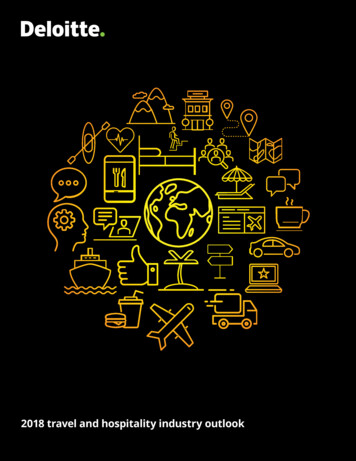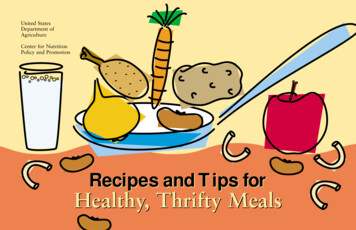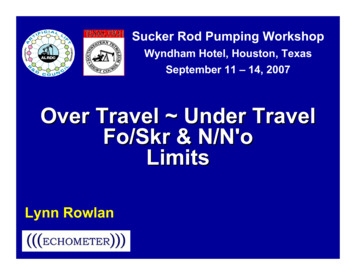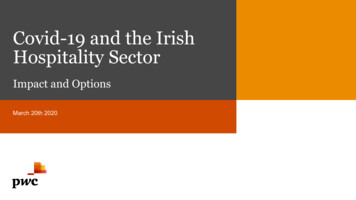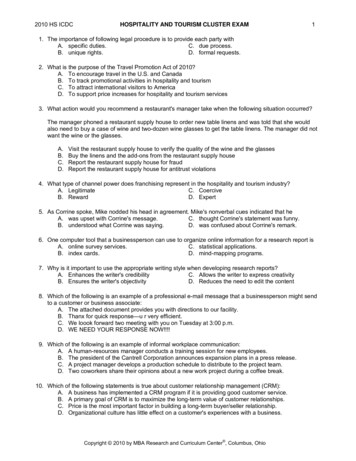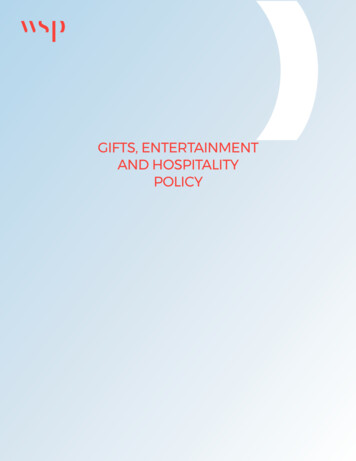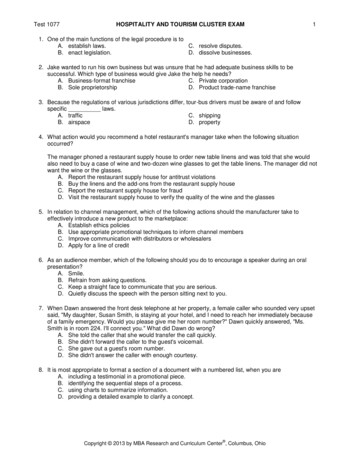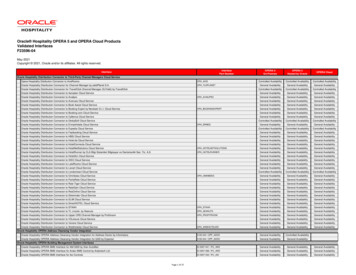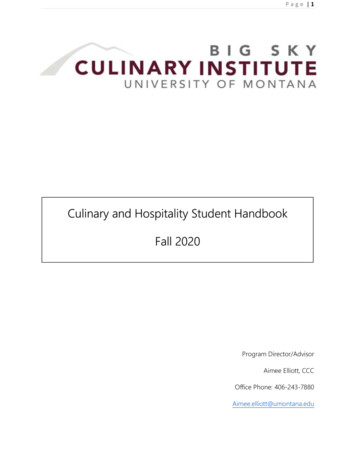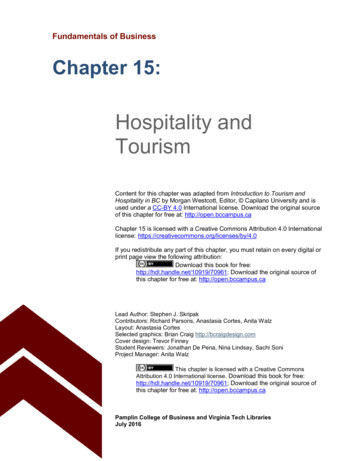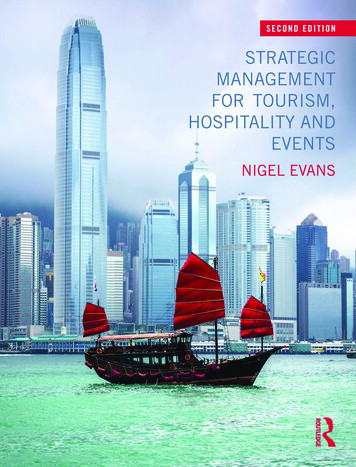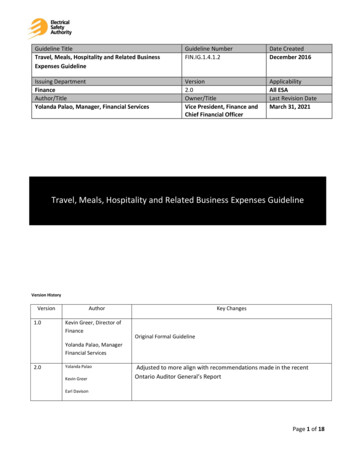
Transcription
Guideline TitleTravel, Meals, Hospitality and Related BusinessExpenses GuidelineGuideline NumberFIN.IG.1.4.1.2Date CreatedDecember 2016Issuing DepartmentFinanceAuthor/TitleYolanda Palao, Manager, Financial ServicesVersion2.0Owner/TitleVice President, Finance andChief Financial OfficerApplicabilityAll ESALast Revision DateMarch 31, 2021Travel, Meals, Hospitality and Related Business Expenses GuidelineVersion HistoryVersion1.0AuthorKevin Greer, Director ofFinanceKey ChangesOriginal Formal GuidelineYolanda Palao, ManagerFinancial Services2.0Yolanda PalaoKevin GreerAdjusted to more align with recommendations made in the recentOntario Auditor General’s ReportEarl DavisonPage 1 of 18
Guideline TitleGuideline NumberTravel, Meals, Hospitality and Related Business Expenses GuidelineFIN.IG.1.4.1Issuing DepartmentFinanceApproval DateMARCH 31, 2021INDEXSection .0GUIDELINE CONTENT4.14.24.34.44.54.64.7AccountabilityRecord KeepingModes of TravelInternational TravelMedical InsuranceParkingToll Roads45599994.8Travel Loyalty Programs104.9Accommodation104.10Meal Related Business ExpensesEmployee MealsBusiness Expenses for Corporate EventsHospitality111314GratuitiesTelephone Calls While Travelling on ESA BusinessOffice Expenses While TravellingOther Business ExpensesConsultants and 34.144.155.0LEGISLATIVE AUTHORITY176.0EVALUATION, MONITORING AND REVIEW177.0INTERPRETATION178.0ASSOCIATED POLICIES AND PROCEDURES189.0ASSOCIATED REFERENCES18Page 2 of 18
Guideline TitleGuideline NumberTravel, Meals, Hospitality and Related Business Expenses GuidelineFIN.IG.1.4.1Issuing DepartmentFinanceApproval DateMARCH 31, 20211.0 Purpose1.1The purpose of this Travel, Meals, Hospitality and Related Business Expenses Guideline (“the Guideline”)is to set out the parameters for determining fair, reasonable, and appropriate travel, meal, hospitality andrelated business expenses that strike a balance among economy, health and safety, fairness and efficiencyof operations.2.0 Scope2.1This Guideline applies to all:a)Acquisition of, and reimbursement for, travel, meals, hospitality and related expenses at ESA(excluding moving/relocation expenses); andb)ESA employees, Board Members, Advisory Committee and Appeal Panel members, contractorsand consultants.2.2Notwithstanding that the term “employee” has been used throughout this Guideline, this Guideline shallapply to Board Members, Advisory Committee and Appeal Panel members, contractors and consultantsexcept as otherwise expressly prohibited or modified in section 4.1.5 and anywhere else in this Guideline.2.3The Procedures for payment or reimbursement associated with the types of business expenses referencedherein are outside the scope of this Guideline, and are set out separately in ESA’s Business ExpensesProcedure.2.4Nothing in this Guideline shall be construed as preventing ESA from refusing to reimburse an expenseclaimed which violates ESA’s Business Expenses Procedure and/or is found by ESA to be unreasonableand/or inconsistent with the spirit of this Guideline.2.5In the event of any inconsistency between this Guideline and an express provision of an applicableCollective Bargaining Agreement, the applicable provision of the collective agreement shall prevail to 2.6This Guideline provides direction on the most common types of travel, meal, hospitality and relatedbusiness expenses. Listing every potential business expense or set of circumstances is beyond the scopeof this Guideline, therefore, the obligations for employees to seek further direction where necessarybefore incurring business expenses is set out in Section 4.1.5 of this Guideline.Page 3 of 18
Guideline TitleGuideline NumberTravel, Meals, Hospitality and Related Business Expenses GuidelineFIN.IG.1.4.1Issuing DepartmentFinanceApproval DateMARCH 31, 20213.0 ObjectivesThe objectives of this Guideline are to ensure that the principles of the Procurement Policy areimplemented when incurring travel, meal, hospitality, and related business expenses by ensuring:3.1ESA dollars are used prudently and responsibly with a focus on accountability and transparency;3.2Expenses incurred for travel, meals, hospitality and related business matters support ESA’s mandate andare necessary, economical, and give due regard to health and safety;3.3Employees are aware of the parameters for determining what constitutes a reasonable and appropriatetravel, meal, hospitality, or related business expense in accordance with ESA’s policies, procedures, andguidelines.3.4Legitimate authorized business expenses incurred during the course of ESA business are reimbursed.4.0 Guideline Content4.1Accountability:a)Reasonable Decision Making4.1.1All expenses covered in this Guideline are subject to the appropriate approval requirements set out in thePolicy for Delegation & Exercise of Authority and Organizational Authority Register (“OAR”), and theBusiness Expenses Procedure.4.1.2This Guideline provides an overview of best practices for exercising discretion inherent in thoseauthorities.4.1.3All employees are accountable for the discretion exercised when incurring business expenses. Whendetermining if a business expense is reasonable under the circumstances, all employees should considerwhether the expense being considered is: able to stand up to scrutiny by auditors and stakeholders;properly explained and documented;fair and equitable;reasonable and appropriate under the circumstances;consistent with this Guideline;in compliance with the principles and mandatory requirements set out inthe Procurement Policy, the Business Expenses Procedure and any otherapplicable policies, procedures and guidelines.Page 4 of 18
Guideline TitleGuideline NumberTravel, Meals, Hospitality and Related Business Expenses GuidelineFIN.IG.1.4.1Issuing DepartmentFinanceApproval DateMARCH 31, 20214.1.4Each Approver should ensure that this Guideline is reviewed with each direct report annually so theyknow how to apply this Guideline within the context of his or her position at ESA so that:a)employees understand their obligations (e.g. the parameters for any blanket pre-approvals foremployees who have frequent or regular travel as part of their positions); andb)this Guideline is applied consistently.4.1.5Each employee is responsible for seeking direction from his or her Approver or Finance before initiatingthe business expense (particularly when the expense is anything outside of the typical kind of expenseclaimed) if he or she is not clear as to whether an expense would be deemed “reasonable” under thisGuideline and approved for reimbursement.4.2Record Keeping4.2.1Each employee is responsible for good record-keeping practices related to business expenses inaccordance with all the provisions of the Business Expenses Procedure, including but not limited to,retaining itemized receipts and payment slip (if applicable) showing total paid for all business expensesunless otherwise exempted in the Business Expenses Procedure.4.3Modes of Travel4.3.1Reimbursement is provided for reasonable and necessary modes of transportation (taxi, rental car, train,etc.), when required for ESA business purposes.4.3.2When making decisions, proper consideration shall be given to the most economical mode oftransportation while balancing health and safety and efficiency of operations. Guidelines for specificmodes of transportation are as follows:a) Vehicles(i) Choosing the Appropriate VehicleWhen road travel is the most practical and economical way to travel, the following apply: Where an employee has an ESA provided vehicle, that vehicle should be used instead ofrenting a car or using a personally owned vehicle. If an employee does not have an ESA vehicle, and chooses to use a personal vehicle, his or herApprover should monitor the extent of the usage of the personal vehicle by the employee asPage 5 of 18
Guideline TitleGuideline NumberTravel, Meals, Hospitality and Related Business Expenses GuidelineFIN.IG.1.4.1Issuing DepartmentFinanceApproval DateMARCH 31, 2021required, to ensure that under the circumstances (considering such factors as cost, health andsafety, practicality, and efficiency of operations), it would be prudent to use a rental vehicleor an ESA vehicle.(ii)(iii)Accident Reporting When driving for ESA business in a personal vehicle, accidents must be reported immediatelyto ESA, to the applicable insurance provider, and to the local law enforcement agency asrequired by law. When driving for ESA business in a rental vehicle, accidents must be reported immediately toESA, to the rental car agency, to the applicable insurance provider, as otherwise requiredunder the rental agreement, and to the local law enforcement agency as required by law. When driving an ESA Fleet vehicle, accidents shall be reported in accordance with theparameters of the Vehicles Supplied to ESA Personnel Procedure.Specific Requirements for Particular Types of VehiclesAdditional specific guidelines for ESA vehicles, personal vehicles and rental cars are as follows:1) ESA VehiclesFleet vehicles should be operated in accordance with the parameters of the Vehicles Suppliedto ESA Personnel Procedure.Personal Use of ESA vehicle should be in accordance with the parameters of internal “FleetGuidelines for Personal Use and Vehicles Supplied to ESA Personnel Procedure”. An“Accountability Form for Personal Use of ESA Vehicle” (Appendix K) of “Business ExpensesProcedure” must be completed by January 31st every year.Personal Use declaration and reporting must conform to the internal “Procedure forReporting Taxable Benefit Expenses”.2) Personal VehiclesWhen using a personal vehicle, Employees must follow the rules pertaining to personalvehicles set out in section 4.1.1 of ESA’s Business Expenses Procedure, which state that: It is recommended that the employee informs his or her insurance company that thepersonal vehicle will be used for business purposes;Page 6 of 18
Guideline TitleGuideline NumberTravel, Meals, Hospitality and Related Business Expenses GuidelineFIN.IG.1.4.1Issuing DepartmentFinanceApproval DateMARCH 31, 2021 ESA will assume no financial responsibility related to the employee’s vehicle. ESA willhowever, pay employees the km reimbursement rate that is identified in the HumanResources section of ESA’s intranet, which is inclusive of any costs for the vehicle by theemployee, including, but not limited to, insurance, gas and repairs. The km reimbursement rate is determined by the Human Resources departmenton a monthly basis using the Private Transportation Index and as agreed by otherHydro successor companies. For claims greater than 5,000kms in a calendar year, see “Procedure for ReportingTaxable Benefit Expenses”. When calculating reimbursement for kms for local travel in accordance with ESA’sBusiness Expenses Procedure, employees shall claim the distance from their regular workheadquarters to and from the location of the business activity, not the distance betweenthe business activity and their residence unless instructed by Supervisor/Manager totravel directly to/from home and to/from location of business activity ; If the employee is on a temporary assignment/temporary work location, the kmreimbursement shall be the distance between the temporary work location and thelocation of business activity. It is noted that nothing in this provision affects an additionalright under a collective agreement, if one applies, to receive a payroll allowance for travelbetween the regular work headquarters and temporary work location; and Any exemption must be supported by the provisions of applicable collective agreement. For Employees using a personal vehicle on a regular basis for inspections, please seeadditional procedures set out in the Vehicles Supplied to ESA Personnel Procedure.(3) Car RentalsPage 7 of 18
Guideline TitleGuideline NumberTravel, Meals, Hospitality and Related Business Expenses GuidelineFIN.IG.1.4.1Issuing DepartmentFinanceApproval DateMARCH 31, 2021 When renting a vehicle, the most economical and practical size should be obtained,considering factors such as the number of occupants in the vehicle, the business purpose,and safety (including weather) considerations. To ensure ESA has proper insurance for all rental cars, when an employee is renting avehicle for ESA business, the Employee must follow the mandatory requirements forrental cars set out in section 4.1 of the Business Expenses Procedure. Employees shall ensure any requirements to refuel a rental car before returning it arecompleted to avoid additional charges imposed by the car rental agency.b) Public TransitLocal public transportation including hotel/airport shuttle should be used where practical.c) Airplanes, Rail and BusAir, rail or bus travel is permitted where it is the most economical way to travel or otherwisenecessary for business reasons.Economy (coach) class is the standard option for ticket purchase. Travel in business class should nottake place except: For international flights (outside North America) where a Field Evaluation client agreed toreimburse ESA for the cost of the expense;Where it would allow the employee to reduce the overall cost of the travel expenses for ESA(e.g. where Economy class is booked up and waiting for the next flight would result inadditional meals and accommodation costs which would exceed the cost of the upgradedticket); and/orWhere business class seating is required for reasonable accommodation purposes (e.g.medical reasons).d) TaxisTaxi fares related to ESA business are an allowable expense. However, Airport and hotel shuttlesshould be used in place of taxis where practical under the circumstances.Sharing taxis and airport limousines should be considered when employees are going to and from thesame location.Page 8 of 18
Guideline TitleGuideline NumberTravel, Meals, Hospitality and Related Business Expenses GuidelineFIN.IG.1.4.1Issuing DepartmentFinanceApproval DateMARCH 31, 20214.4International TravelWhere international travel is required for ESA business purposes, employees may be reimbursed forreasonable business expenses such as costs related to visas, or immunizations.4.5Medical Insurance4.5.1For information about eligibility for medical, health, and travel accident insurance coverage, employeesand their Approvers should first assess what coverage already exists under ESA’s health insurance plan,and relevant collective agreements (where applicable), so additional unnecessary expenses are notincurred.4.5.2Approvers should consult with Human Resources if assistance is required to determine what, if any,further out of country insurance is required and reimbursable under the circumstances.4.6Parking4.6.1Reimbursement is provided for necessary and reasonable expenditures on parking when driving on ESAbusiness. Where practical, parking violations should be avoided.4.7Toll Roads4.7.1Toll roads should not be used routinely; however, it is expected/understood that certain roles such asInspectors routinely require the use of toll roads to perform their ESA duties;4.7.2Toll roads may be used for business reasons where employees and Supervisors/Managers deem it to bereasonable under the circumstances as set out in Section 4.1.3 Reasonable Decision Making;4.7.3Reimbursement should not be provided for travel on toll roads during regular commuting between theemployee’s home and work, or other travel of a personal nature unless the expense has been preapproved by the Approver for business reasons;4.7.4If an employee regularly uses toll roads without a transponder (regular use is defined as at least 12 timesin a fiscal year) and does not have a transponder, the employee should speak to a supervisor so thatconsideration can be given as to whether obtaining/leasing a transponder would be more economical forESA.4.7.5Any “personal use” of ESA paid toll road charges must be reported immediately to immediate supervisor,and paid for by the ESA employee in accordance with section 4.1.1 of the Business Expenses Procedure.4.8Travel Loyalty ProgramsPage 9 of 18
Guideline TitleGuideline NumberTravel, Meals, Hospitality and Related Business Expenses GuidelineFIN.IG.1.4.1Issuing DepartmentFinanceApproval DateMARCH 31, 2021Employees are permitted to participate in loyalty programs (e.g. frequent flyer) provided they select themost cost effective expense decisions. Any income tax consequences resulting from such programs arethe responsibility of the employee. If a discounted or free item is obtained through points (e.g. a freeflight) and used for ESA business, only the expenses actually paid by the employee (e.g. taxes and fees)will be reimbursed, and not the value of the item.It is noted that ESA’s Corporate Procurement Card Program does not have a frequent flyer, air miles, orany points accumulation feature.4.9Accommodation4.9.1Reimbursement is provided for necessary and reasonable expenditures on accommodation whenrequired for ESA business purposes.4.9.2Single accommodation in a standard room is considered reasonable, unless documented prior approval isreceived (unless due to the hour at night that the room is booked approval cannot be obtained) has beenreceived for a superior room due to such factors as need for medical accommodation, lack of availabilityin hotel, etc. As per the Business Expenses Procedure, any upgrades for personal reasons (e.g.accompanying spouse and children) is non-reimbursable.4.9.3The employee is responsible for all charges that are to the employee’s room other than reimbursableexpenses identified under one of the other sections of this Guideline. See ESA’s Business ExpensesProcedure for further details.4.9.4 Private stays with family and friends are acceptable in lieu of commercial accommodation, and a gift maybe provided to the friends and family where ESA would have had to pay for commercial accommodationfor the employee for ESA business. For a gift to the host to be deemed reasonable, it must:(i)Cost a daily maximum of 30 (which includes any of their costs for accommodation, foodetc.);(ii)Be in the form of a small gift or gift card (not cash or cheque); and(iii)4.9.5Be accompanied by an itemized receipt when a claim for reimbursement is made inaccordance with the Business Expenses Procedure.For extended stays at a single location, accommodation options with discounts for long-terms stays shouldbe considered.Page 10 of 18
Guideline TitleGuideline NumberTravel, Meals, Hospitality and Related Business Expenses GuidelineFIN.IG.1.4.1Issuing DepartmentFinanceApproval DateMARCH 31, 20214.9.6Employees working in Field Evaluations whose accommodation and related expenses have been agreedto and are fully paid for by customers, may deviate, within reason and approved by the Managing Director,from the guidelines set out under section 4.9 of this Guideline.4.9.7Accommodation for employees within his/her work headquarters (or temporary work headquarter) areais not reimbursable unless approved by Management for team building purposes or not practical for theemployee to go home under the circumstances.4.10Meal Related Business Expenses4.10.1 Employee Meals1.Reasonable and appropriate meal expenses at restaurants may be reimbursed to an employee when anemployee is on ESA business, and one or more of the following apply (as modified by section 4.10.1(2)below for employees bound by an applicable collective agreement):ESA Inspector Meals Daily Inspector and Senior Inspector lunches are reimbursed. The daily amount spent is subject toperiodic reasonability test and review by ESA management. When incurring a meal for business purposes or where entitled within collective agreements, eachESA employee will pay for, and claim their own meal on a separate receipt. The only employeeswho are able to pay for meals for a group of ESA staff are a Vice-President and/or thePresid
travel, meal, hospitality, or related business expense in accordance with ESA’s policies, procedures, and guidelines. 3.4 Legitimate authorized business expenses incurred during the course of ESA
